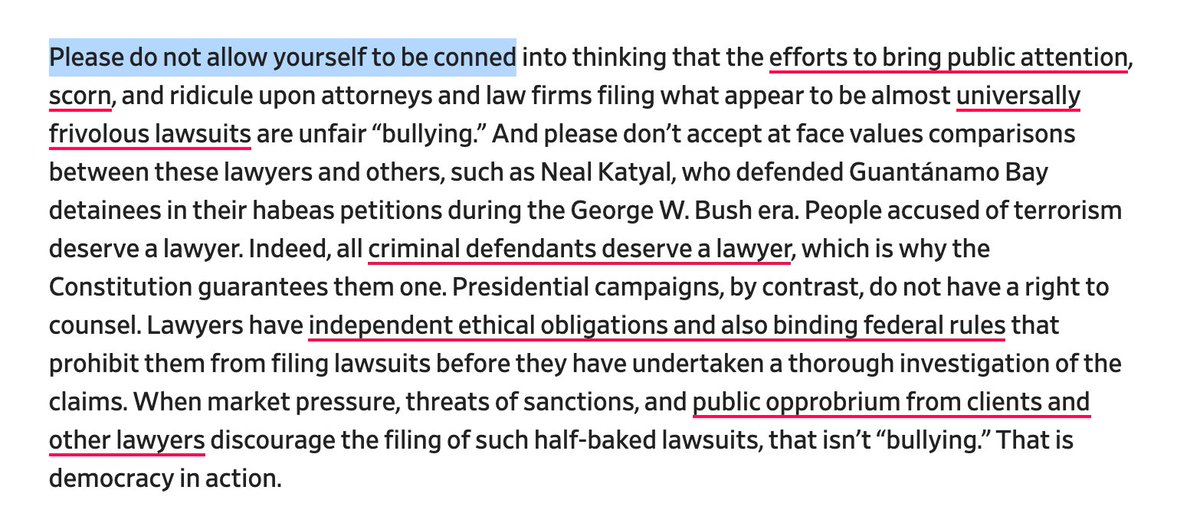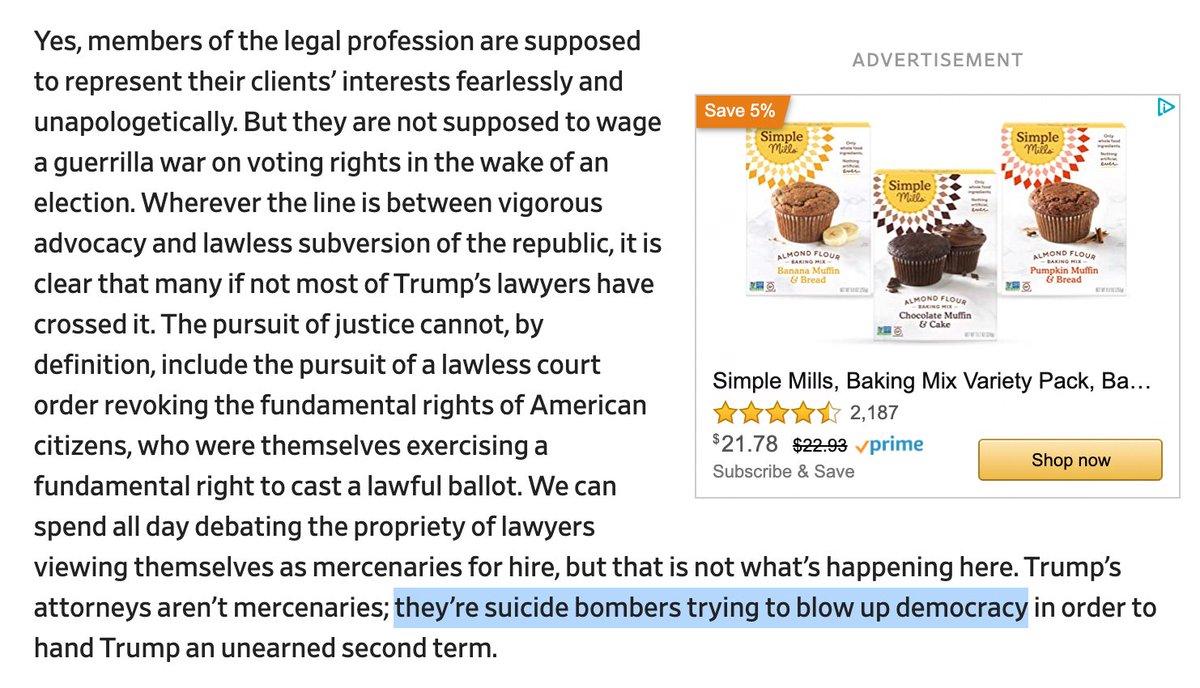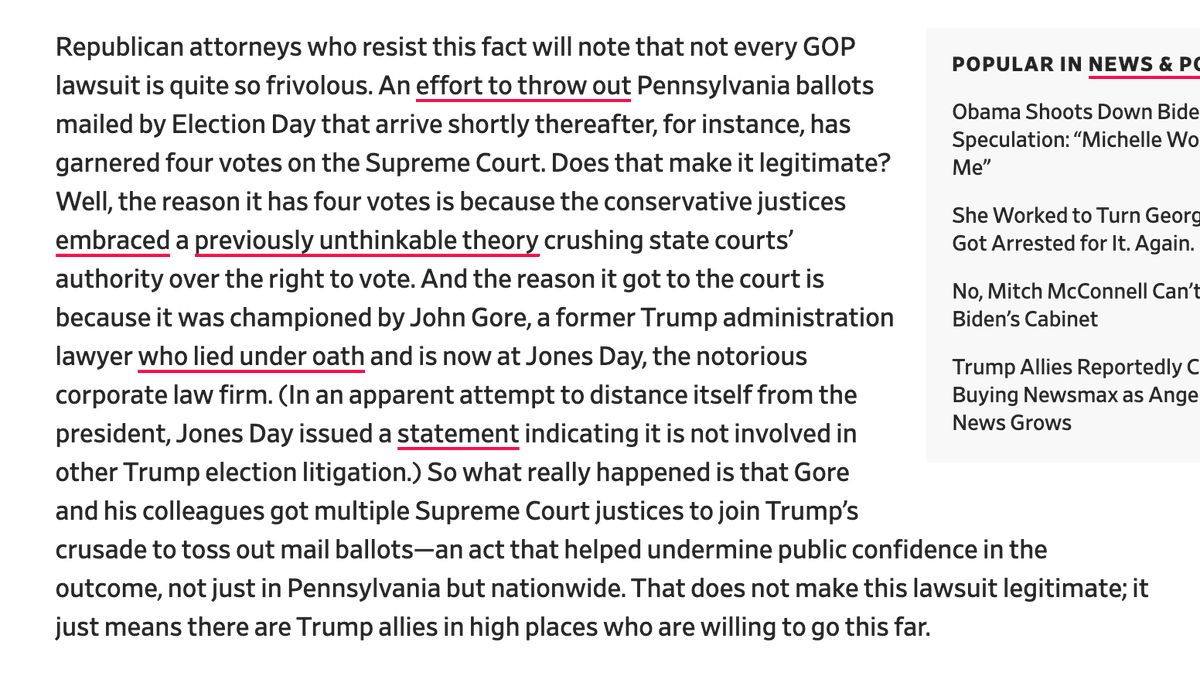Over at Slate, @Dahlialithwick and @mjs_DC argue that those of us who object to @ProjectLincoln's campaign against @JonesDay are not just mistaken, but are trying to con you.
Here's a thread on why I disagree. https://slate.com/news-and-politics/2020/11/trump-election-lawyers-deserve-scorn.html
Here's a thread on why I disagree. https://slate.com/news-and-politics/2020/11/trump-election-lawyers-deserve-scorn.html
"Do not let yourself be conned" by those (including me) who object to campaigns against the firms, they say: The lawyers are "suicide bombers trying to blow up democracy" who must be condemned and shamed. To disagree is to argue that lawyers should "never be held accountable."
That is true, Dahlia and Mark argue, even if the lawyers have arguments that might win in court. If judges agree with the lawsuits, that just shows that judges are in on the con. The judges and their false views of "law" are acting just as illegitimately as the lawyers.
I have a different view, and I thought I would expand on why.
First, I don't think anyone is arguing that the lawyers shouldn't be held accountable for bogus lawsuits. Under the ethics rules, lawyers can be punished for filing frivolous suits. They can even be disbarred.
First, I don't think anyone is arguing that the lawyers shouldn't be held accountable for bogus lawsuits. Under the ethics rules, lawyers can be punished for filing frivolous suits. They can even be disbarred.
It's entirely appropriate for a lawyer who filed a lawsuit in violation of the ethics rules to be punished by the bar for that. I'm fine with severe punishments for that if appropriate, including disbarment. That's fine.
But what is happening here is quite different, I think.
The @ProjectLincoln's campaign against @JonesDay isn't criticism about a particular lawyer who filed a particular claim. It's an effort to pressure a 2,5000 lawyer firm to drop a client.
The @ProjectLincoln's campaign against @JonesDay isn't criticism about a particular lawyer who filed a particular claim. It's an effort to pressure a 2,5000 lawyer firm to drop a client.
The starting premise is that @JonesDay lawyers are internally divided on this representation, so that upping the pressure on the firm -- by criticizing the firm, hurting recruitment, and getting other clients to complain -- can get them to drop out. https://www.reuters.com/article/usa-election-jones-day/blowback-against-trump-campaign-law-firm-targets-clients-recruiting-idUSKBN27S24E
Dahlia and Mark celebrate this as "democracy in action." Their rosy view is premised, I gather, on their confidence that there's a simple line between good and evil and that everyone obviously knows the difference (even if some people try to "con" you by pretending otherwise).
But I don't think that's right. Which side of highly controversial legal cases involves good or evil is often contested, entirely in good faith. Sometimes that's just because people are on different sides. But it's also b/c because people just use different reference points.
For example, imagine a lawyer is representing a truly reprehensible client who happens to have a strong legal claim for relief based on a legal doctrine that courts have wrongly recognized and that has problematic effects but that might vindicate an important principle.
On one hand, you could say that the lawyer's claim is evil because it tries to help a reprehensible client, it causes problematic effects, and it relies on a doctrine that shouldn't exist.
On the other hand, you could say that the lawyer's claim is good because it is a strong legal claim under current law, and it might vindicate an important principle.
It seems to me that you can get agreement on which side is right in specific cases among those that share all the same priors. But the agreement quickly breaks down once you go outside that bubble.
Given that I see the good/evil line as often contested in good faith, and murkier than it seems, I tend to see campaigns to get law firms to drop despised clients as problematic generally. I tend to see examples of it as part of that problematic whole.
Of course, I realize others disagree, and in good faith. I think it's just two ways of looking at the problem. /end

 Read on Twitter
Read on Twitter




